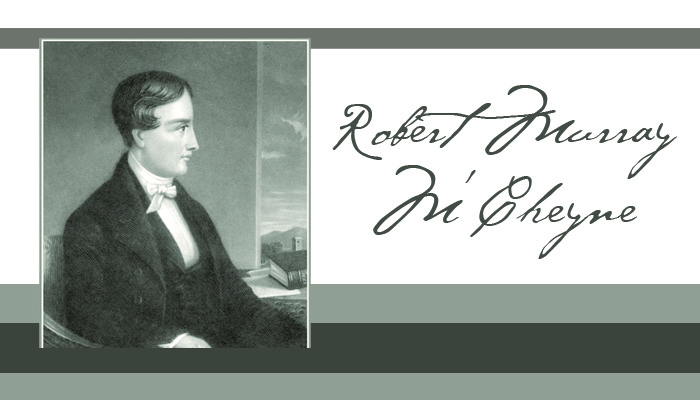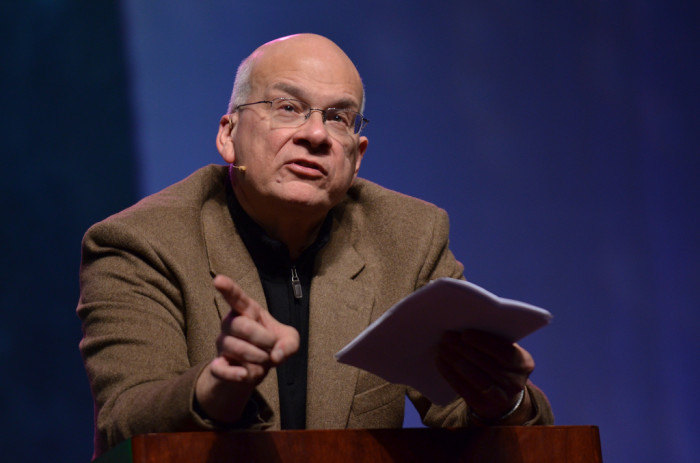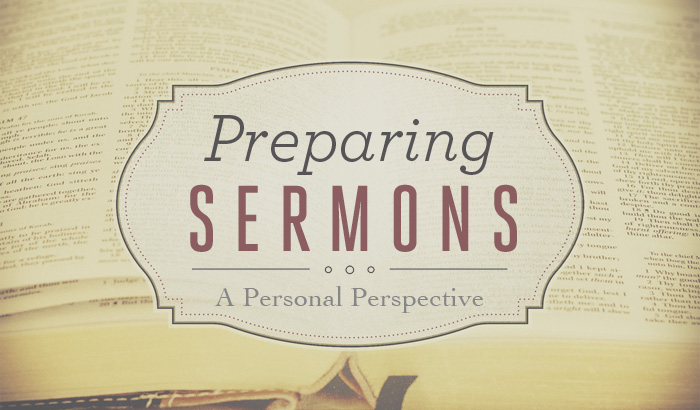“For the Gospel the Bible must be used. The minister must so live in it that he wears it easily. One reason why people are repelled from it is that the preachers cannot carry it with easy mastery. They are in Goliath’s armour. Now the ideal ministry must be a Bibliocracy. It must know its Bible better than any other book.” – P.T. Forsyth, Positive Preaching and the Modern Mind, 37.
Category Archives: Preaching
What Should a Pastor Be?
No man has influenced my pastoral life and vision more than Robert Murray M’Cheyne. He was a man of ordinary gifting, but of tenacious love for the sufficiency and beauty of Jesus Christ. The more I read him the more I’m convinced few pastors of old are as worthy to hear today as Mr. M’Cheyne (hence why I hope to do my PhD research on him).
26 Traits of a Faithful Pastor
In one morning’s bible reading M’Cheyne meditated on 1 Thessalonians 2 and Paul’s example of ministry to the church at Thessalonica. In a manuscript quarto—think “journal”—M’Cheyne answered the question, “What should a minister be?” from Paul’s instruction. He came up with twenty-six different characteristics of healthy gospel ministry. May these encourage and challenge you:
- Bold in our God. Having the courage of one who is near and dear to God, and who has God dwelling in him.
- To speak the Gospel. He should be a voice to speak the gospel, an angel of glad tidings.
- With much agony. He should wrestle with God, and wrestle with men.
- Not of uncleanness. He should be chaste in heart, in eye, in speech.
- Not of deceit or guile. He should be open, having only one end in view, the glory of Christ.
- Allowed of God to be put in trust. He should feel a steward, entrusted of God.
- Not as pleasing men, but God. He should speak what God will approve, who tries the heart.
- Neither flattering words. He should never flatter men, even to win them.
-
Nor a cloke of covetousness. Not seeking money or presents, devoted to his work with a single eye.
-
Nor of men sought we glory. Not seeking praise.
-
Gentle even as a nurse.
-
Affectionately desirous of you. Having an inward affection and desire for the salvation and growth of his people.
-
Willing to impart our own souls. Willing to suffer loss, even of life, in their cause.
-
Laboriousness night and day.
-
To preach without being chargeable, to any of his people.
-
Holily.
-
Justly.
-
Unblameably we behaved among believers.
-
The daily walk.
-
Exhorted every one. Individuality of ministry.
-
As a father. Authority and love.
-
Thank we God. He should be full of thanksgiving without ceasing.
-
Should be with his people in heart, when not in presence.
-
Endeavoured to see you. His people his hope. That which animates him.
-
And joy. Immediate delight.
-
And crown of rejoicing. When he looks beyond the grave.
How to Preach to the Heart
For my mind there are two reasons Tim Keller’s preaching continues to reach such a swath of hearers: 1) he knows how to vividly preach the gospel from the whole counsel of God, and 2) he is a master at preaching to the heart.
Chapter six, “Preaching Christ to the Heart,” in his recent Preaching: Communicating Faith in a Skeptical Age offers untold homiletical riches on the subject of heralding heart-searching sermons. It includes a section appropriately designated, “How To Preach to the Heart.” Keller offer’s six adverbs to help preachers connect their sermons to their people’s hearts. Here they are with some brief comments from The Manhattan Man.
Preach Affectionately
“If you want to preach to the heart, you need to preach from the heart. It’s got to be clear that your own heart has been reached by the truth of the text. This takes non-deliberate transparency. Heart-moving preachers (in contrast to heart-manipulating ones) reveal their own affections without really trying to. What is required is that as you speak it become evident in all sorts of ways that you yourself have been humbled, wounded, healed, comforted, and exalted by the truths you are presenting, and that they have genuine power in your life.”
Preach Imaginatively
“To engage the heart is also to engage the imagination, and the imagination is more affected by images than by propositions. Here we are talking about what are usually termed ‘sermon illustrations.’ . . . The essence of a good illustration is to evoke a remembered sense experience and bring it into connection with a principle. That makes the truth real both by helping listeners better understand it and by inclining hearts more to love it.”
Preach Wondrously
“If we are going to preach to the heart, we need also to evoke wonder . . . Christian preachers and teachers must preach in such a way as to show people the profound good news of that truth. They must point these things out at every turn and have the sense of wonder appropriate to such astonishing claims. Even those of us who believe in the gospel cannot take it in. We do not preach with the tears of joy we should so often have. As we preach we should always open ourselves to let the wonder sink in.”
Preach Memorably
“Some modern expository preachers spend so much time on understanding and explaining the text that they have little time to think about two other things: practical application and striking, memorable, fluent use of language. One thing that makes a sermon memorable is its insight. Rather than telling the listeners things they already know in terms they know, a memorable address is filled with fresh, insightful ways of conveying concepts—concepts the listeners may already know at one level but find new and interesting.”
Preach Christocentrically
“Here I need only to say that preaching Christ is not only the ultimate way to fully understand a text, nor just the best way to simultaneously reach those who don’t believe and those who do, but also the way to be sure that your address moves beyond a dry lecture and becomes a real proclamation of the truth that reaches the heart.”
Preach Practically
“Preaching to the heart is to preach practically . . . diversify your conversation partners . . . diversify whom you picture as you prepare . . . weave application throughout the sermon . . . use variety . . . be emotionally aware . . . Be sure, when you deal very specifically with people’s behavior and thoughts, that you combine an evident love for them with your straight talk about sin. Be both warm and forceful when dealing with personal questions—never scolding, never even disappointed.”
1 Timothy 4:13 Pastors
I tend to think you can tell a lot about a homeowner by looking at his yard. Is the grass thriving and weeds diminishing? Are the plants tended and trimmed? Rarely have I seen a lawn so cared for and not found out that it’s owner is not known for diligence, precision, and care.1 The yard of a home announces something of the character of its owners—whether we like it or not.
There is something similar for those of us who preach. Something that generally comes in the front of our sermons and reveals much about how we approach God’s word: the Scripture reading.
The Forgotten Command of Pastoral Ministry?
One of the forgotten pastoral commands in Scripture is that ordinary pastors are to read Scripture in public. Paul told his young protégé in 1 Timothy 4:13, “Until I come, devote yourself to the public reading of Scripture, to exhortation, to teaching.” My aim in this post is two-fold: 1) to convince you to start your exposition by reading God’s word, and 2) to introduce your reading of God’s word in a particular way. The degree to which we are doing these things is a measure of our obedience to Paul’s command. It’s also a mirror into what we believe about God’s word.
Start with God’s Word
My first aim need not take us long. I believe the best sermons are begun by the preacher reading part of or the totality of the passage he is about to exposit. Just as a call to worship lets God have the first word in the worship service, so too does a Scripture reading of the given text let God have the first word in the sermon.2 Now, I’m not saying that the first word out of the preacher’s mouth must be the reading of his passage. Transitions and segues are often necessary for services to retain some sense of smoothness. Yet, what I am saying is that before any real work of exposition is done we ought to read our passage.
This not only let’s God have the first word in the sermon, it also implicitly communicates something to our congregations. It points to hope and faith in the truth that God’s word brings life to His people. Our reading of Scripture consists of the only guaranteed-to-be-inspired-and-so-bring-life words we will speak that day.
I assume many of you are convinced of this necessity. Let’s then think about how we can introduce the reading in a way that perpetuates reverence and expectancy in our hearers.
Think Of Yourself As a Covenant Lawyer
I was trained in a Presbyterian context where the preacher would say something after, not before, reading the passage. Usually it was something like, “Thus far the reading of God’s word,” or, “Thus ends the reading of God’s holy, inspired, and inerrant word.” It must be said that such an approach is not bad, not bad at all. But I do think we can do something better.
You may not have thought about it in this way before, but preachers—like the prophets of old—are something like God’s covenant lawyers. They defend God’s word and prosecute the truths of Jesus Christ in order to establish and edify Christ’s church. Do you remember how the old-school covenant lawyers introduced God’s word? ‘Thus saith the LORD.” Now that’s an introduction to God’s word full of power. It demands attention and raises expectation. God is speaking! “Hear ye! Hear ye!”
Modern-day heralds can, and I think ought, to do something similar. Whenever we read God’s word prior to the sermon there is great wisdom in introducing it with a powerfully precise phrase. It’s my own practice to say, “Let’s hear now as God speaks to us through His word.” I want my congregation to know something supernatural is about to occur, God is speaking to us. Whenever someone reads Scripture in the middle of our service they do so by saying, “This is the word of the Lord . . .” Some other introductory statements I’ve heard from other people are:
- “These are the very words of God.”
- “These are the perfect, life-giving words of God.”
- “Listen to God’s unchanging and unfailing word.”
- “Hear God’s holy word.”
Whatever you say, say something authentic to your personality. Say something honoring to God’s word. And then unleash the power of God.
—————————————————————————————————–
- This is, of course, not to say that any lawn not so cared for is thus owned by someone lazy or disorganized. Maybe the owners just moved in. Maybe they have an impossible sprinkler system. We don’t need to stretch the analogy too far. ↩
- I know many churches will have someone other than the pastor read the text before the sermon, but I’d encourage something different. Let that individual read, at another point in the service—maybe before the song that precedes the sermon—, a passage complementary to the sermon text. This allows God’s word to more permeate your liturgy and it allows the preacher to a 1 Timothy 4:13 kind of pastor. ↩
One Process for Sermon Prep
Some of the most helpful things I’ve learned throughout the years regarding sermon prep have come from hearing how other brothers go about the work week in and week out. Sometimes I’ve heard about a model that resulted in small adjustments to my current process. At other times I came across a preparation plan that was almost revolutionary. I thus personally love to hear how other preachers prepare their sermons. I doubt I’m alone in this.
Last week I had three different conversations with people inquiring about my personal process for sermon prep, so I thought I might as well throw up a post about what it looks like. Some of you might read this and take nothing away. No offense will be taken. But maybe, just maybe, some small slice of what I do can stir up something useful for your own process.
Here we go then.
Sunday
Our church currently meets on Saturday night—if you’re a church planter meeting on Saturdays is the one thing I’d never do if I did it all over again—so Sunday is something of my first day for sermon prep. I know brothers who like to take off “the day after preaching,” but I find that’s when my preaching energy is often highest. Why? To be honest, because I usually spend Saturday night in spiritual doldrums. I fall asleep thinking, “There’s no way I can do it again next week.” Yet, what feels like despair late Saturday night has morphed into, by Sunday morning, fresh vigor for the upcoming sermon. My mind wakes up eager with something like, “I can do better! I must do better! Time to get going!”
So, when my kids are taking their afternoon nap I like to spend 2-3 hours meditating on the planned text for the next week.1 If it’s a short section, I try to memorize the text. If it’s a long section (for example, this week I’m preaching on Genesis 12-17) I read the text over and over trying to get a sense of its particular contours. As I’m doing this I have a document open on my computer where I can put down anything that comes to mind about possible points, illustrations, or quotes. By the end of Sunday afternoon I hope to have a fair idea about these four things:
- The main point of the text (MPT). This is my restatement, in a sentence or so, what the main point is of the given passage.
- The main point of the sermon (MPS). This my contemporary application of the MPT for my given congregation.2
- Divisions. Think of these as headings for the text, or rhetorical signposts to guide the hearer through the text.
- Final exhortations. While I desire to liberally sprinkle applications throughout the entire sermon I usually offer sustained application at the end of the sermon. I think the average hearer innately approaches truth in this order: “Tell me what the truth is, and then tell me what I’m supposed to do with it.” Thus, my final exhortations try to seize this natural progression by offering summary applications from the text that individuals and the congregation can be challenged by.
Monday
Barring any crisis or emergency I don’t schedule meetings on Mondays. This allows me to devote the entire day—often about nine hours—to sermon prep. Usually I read commentaries and relevant resources first thing in the morning, jotting down anything of value for the sermon. The books are also dialogue partners for question I wrote down about the text on Sunday. I then put the proverbial pen to paper and start writing the first draft of the manuscript.3 This is all I do on Monday—write, write, write. My goal is to have the first draft of the manuscript, usually about 3,200 words, done by lunch time on Tuesday, at the latest.
Tuesday-Wednesday
If the manuscript needs more attention I’ll work on it Tuesday morning, but it’s rare when the first draft isn’t done by 11am on Tuesday. While some brothers have told me before it’s crazy to have a legitimate draft done so early in the week, it bears noting that by this point I’ve often spent twelve hours in sermon prep. Once the first draft is done I set it aside until Thursday morning. This allows me about 48 hours to meditate on the finer points of the text and structural elements of the sermon. I find this meditation time is vital to having a warm, living sermon by the weekend. It’s during these two days that improvements to illustrations pop into mind (or new illustrations altogether), applications become more pointed, and explanation gains clarity.
Thursday
Thursday morning I read through the sermon twice as if I was preaching it. Although this may sound like a dry run rehearsal, it’s really not. I’m just trying to see how the language fits and I make edits as needed—there is regularly a substantial amount to change. The editing process on Thursday normally accomplishes two things, the first of which is cutting the homiletical fat. Rarely does a Thursday go by without the manuscript shrinking a fair amount. This, I hope, is a good thing as it usually means an increase in concision and precision. The second thing Thursday achieves is that the sermon writes its way onto my heart and into my head.
I take time in the afternoon to put together a sermon notes insert for our weekly gathering guide. This labor allows be to hone the language on my main points and key applications, which I hope provides the sermon with many different hooks on which the truth can hang.
Friday
I do nothing other than pray. I try as best I can to spend the day with family and turn off explicit focus on the sermon.
Saturday
It’s go time. Our church gathers at 5pm and I’m at the building no later than 12pm. My goal is to always read through the manuscript two more times to cement it into memory. My propensity to saturate the manuscript with color helps this happen quickly. After I spend at least an hour in concentrated prayer for the preaching time. I will sit in various seats in the meeting room and pray for whomever may fill that seat to have a faithful encounter with God through His word.
From 3:00-4:30pm I assist our musicians as they rehearse by running sound (something I still love to do) and dialoguing about the song arrangements. Then from 4:30-4:45pm I pray with a group of church members who gather to pray for the night’s preacher and preaching.
By about 7:30pm I’m on the way back home, in the doldrums, cataloging everything that went wrong with the sermon while simultaneously praying for the Spirit to supernaturally empower my feeble attempt at heralding the gospel. As mentioned above, this homiletical depression last about twelve hours and then I start the whole process over again.
Random Things of Note
- I hope it goes without saying, but prayer must saturate the entire process. There is always an inextricable link to my confidence in the sermon by Thursday lunch and the amount of time spent in prayer up to that point.
- As best I can tell I probably average about 20 hours a week directly related to sermon prep.
- I want to do a better job of getting feedback on the sermon before it gets preached on Saturday. Too often I’m the only one to look at it before Saturday. It’s more helpful to get other eyes to look at the text and offer explanations, objections, or applications I may not have seen.
- We have provide an “Upcoming Sermons Card” in the weekly gathering guide and encourage our members to read through the week’s text and pray for the planned preacher. I have an untold number of stories of how this little card has brought unique power to the church’s preaching ministry. It’s almost like a sermon prep guide for hearers.
——————————————————————————————————-
- I generally plan out the sermon calendar twelve months in advance and rarely find myself deviating from it. ↩
- Click here for a more detailed post on a MPT and MPS. ↩
- Click here for “Some Merits of a Manuscript.” ↩
Media for Ordinary Pastors
Every TGC National Conference churns out an astonishing amount of useful media for pastors, church leaders, and church members. I’ve worked through much of the media from this year’s conference and here are a five workshops I think will be of unusual benefit for ordinary pastors:
- Tim Keller on “Preaching to the Heart”: In this workshop we will discuss how you can ensure your sermons are neither a lecture nor a rant, but rather how preaching can change people on the spot during the sermon.
- 9Marks panel on “Church Polity? Really?”: There is no shortage of books and conferences and blogs and even movements on the church. But how often do we hear talk of church polity? If anything, many avoid the topic. After all, church government is said to divide Christians, not unite them. Why pay any heed to it at all? Is it that important for the average Christian and for Christian discipleship? If so, how? Does the Bible speak decisively in this area? And if we think it does, how firmly should we hold our convictions when other Christians disagree?
- Ray Ortland on “How to Grow a Gospel Culture in Your Church”: Every church will be more convincing as a witness for Jesus if its doctrine and its culture converge as one. But without a gospel culture, even with glorious gospel doctrine, people will not listen. So much is at stake in the culture and relationships and feel and vibe of our churches! This seminar will equip pastors and church leaders for building this vital dimension in their churches.
- Erik Raymond on “Everyday Evangelism”: As Christians we are commissioned by Jesus to reach our neighbors and the nations with the gospel. We also know that heaven will be populated with a great multitude of people from every nation. In view of the commission and the promise, how do we develop a culture of evangelism in our churches that zealously and faithfully pursue the lost? This session will highlight some practical ways to cultivate and sustain effective evangelism in the church.
- Michael Kruger on “How Do We Know the Bible is God’s Word? Recovering the Doctrine of a Self-Authenticating Scripture”: There are few questions more fundamental to the intellectual integrity of Christianity than the question of how we know whether the Bible is really God’s Word. Many answers have been given to this question, ranging from historical evidences to the testimony of the church. However, often overlooked in such discussions is the answer given by the Reformers themselves: that the Scriptures testify to their own divine origins. This workshop will explore the forgotten doctrine of a self-authenticating Scripture.
Searching for Simple Servants
“The community of faith will place its confidence only in the simple servant of the Word of Jesus, because it knows that it will then be guided not by human wisdom and human conceit, but by the Word of the Good Shepherd.” – Bonhoeffer, Life Together, 107.
The Expositor Podcast
Steve Lawson recently launched One Passion Ministries which looks to be a treasure trove for modern expositors.
OnePassion is committed to training pastors in expository preaching that is firmly anchored in proclaiming God’s Word. We live in a day in which there is a famine in the land for the hearing of God’s Word. In response to this spiritual drought, this ministry is devoted to calling those who stand in pulpits to the high standard of biblical preaching. If we are to see a new reformation in this day, there must, first, be a reformation of the pulpit. Only then can the church experience transcendent worship, authentic godliness, and true evangelism.
Our goal is to provide as many free audio, video and written materials as possible, along with charging minimal for other resources. In return for these materials, ministry donations are appreciated to further these efforts and continue to provide complimentary resources.
One of these complimentary resources is the “Expositor Podcast.” Hosted by Dr. Lawson, “Expositor” provides an informal look into the life and ministry of the expositor. Three times a week Dr. Lawson offers 6-8 minutes snapshots on a variety of matters pertaining to faithful expository ministry.
Subscribe to Expositor or listen to recent episodes here.
Preaching is Terrifyingly Thrilling
“For [Barth], no intellectual pursuit could possibly match the thrill and the terror of the bold and audacious venture to speak about God.” – Marsh, Strange Glory, 53.
Theological Foundations for Preaching
I’ve long thought that David Platt is a wondrously faithful model of how to preach God’s word. He handles Holy Scripture with reverence, clarity, passion, and joy.
Back in 2009 Southwestern Baptist Theological Seminary invited Platt to speak on the topic of “For the Glory of God: Theological Foundations for Text-Driven Preaching” at their annual expository preaching conference. The lecture is full of unction and help for ordinary preachers like myself.







